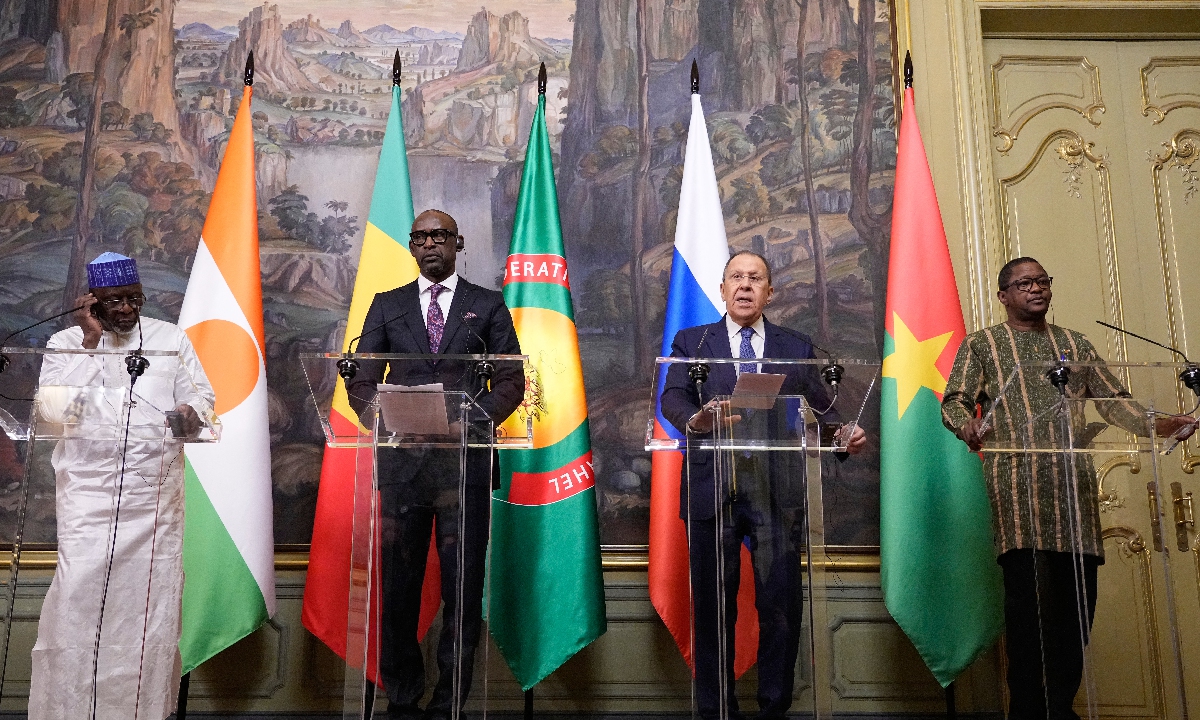
Niger Foreign Minister Bakary Yaou Sangare, Mali's Foreign Minister Abdoulaye Diop, Russian Foreign Minister Sergei Lavrov and Burkina Faso Foreign Minister Karamoko Jean Marie Traore attend a joint press conference following a meeting of Russian foreign minister with foreign ministers of the Confederation of Sahel States in Moscow on April 3, 2025. Photo: AFP
Russian Foreign Minister Sergey Lavrov recently met with his counterparts from Mali, Burkina Faso and Niger in Moscow in the new Russia-Alliance of Sahel States format. Lavrov expressed Moscow's readiness to assist in enhancing the combat ability of each of the three countries' national armed forces, and training military and law enforcement personnel for them, as well as other areas including farm products and energy. This meeting is crucial for Russia's strategic pivot in West Africa, and the strengthened cooperation with Russia will further help the countries in the Alliance of Sahel States shake off the influence of the former colonial powers.
For Russia, its moves in West Africa can be seen as a derivative of the Russia-Ukraine conflict. After the outbreak of the war, European countries, especially France, have overwhelmingly supported Ukraine, not only hailing EU sanctions against Russia but also providing support to Ukraine. Under these circumstances, Russia's pivot on West African countries, previously viewed as France's "backyard," clearly indicates its strategic intentions against France.
As a former French colony, West African countries have been profoundly influenced and even controlled by France in various fields, such as politics, economics, military and culture. However, the rising opposition among West African countries toward France in recent years has led to a rapid erosion in France's influence in the region, forcing it to give up some of its economic and military presence in West Africa. At this moment, Russia is opening a "second front" in West Africa against France, which not only helps to break the sanctions imposed by European countries in various economic areas but also expands Russia's influence in the region and allows it to acquire more resources and markets.
In addition, Russia's Wagner Group has been actively involved in the affairs of several African countries. Therefore, Russia's strengthening of military cooperation with the Alliance of Sahel States is also driven by its intention to counter the presence of Ukrainian security services in Africa and to ensure the operational capabilities and influence of Russian mercenary forces on the continent.
For the three Sahel countries, receiving support from Russia addresses their pressing need to combat domestic insurgencies and extremist threats, as well as resist pressure from the Economic Community of West African States (ECOWAS) and France.
First, the political situation in the Sahel region has long been unstable, with these countries facing severe terrorist threats. In the past, they generally relied on French troops to maintain domestic stability.
Second, the military governments that came to power in Mali, Burkina Faso and Niger after the coups were met with sanctions and resistance from ECOWAS. Support from Russia not only helps these military administrations consolidate control at home and boosts the Alliance's confidence in confronting ECOWAS militarily, but also helps alleviate their economic difficulties.
Third, although France is undergoing a "strategic retreat" from West Africa, its influence in the region will not disappear overnight. Expanding cooperation with Russia across multiple fields could also become an important component of these countries' broader efforts to "decolonize" and reduce dependence on their former colonial power.
The deepening cooperation between Russia and the Alliance of Sahel States marks a key turning point in West Africa's geopolitical landscape. In the face of Western sanctions following the Russia-Ukraine conflict, Moscow is using military support, energy cooperation and political coordination to fill the power vacuum left by France's decline in West Africa. In doing so, it opens a new "second front" against Europe and taps into emerging markets on the African continent.
For the Sahel states, Russian military training and security assistance offer much-needed support in combating terrorism. At the same time, relying on Russian backing helps them weaken France's influence and reshape the regional balance of power and the distribution of political discourse.
The author is a research fellow at the Institute of West Asian and African Studies at the Chinese Academy of Social Sciences and the China-Africa Institute. opinion@globaltimes.com.cn




